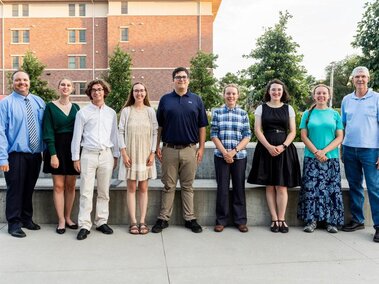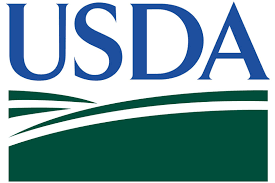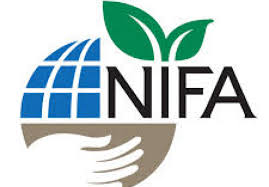REEU: Beneficial Insects and Integrated Plant-Insect Research and Extension Experiences
Description
Students will engage in research and extension opportunities focused on interactions between insects in agroecosystems including pollinators (bees, butterflies), pest management (e.g., natural enemies, stored grain, and emerging pests), vectors transmitting disease to animals (mosquitoes, ticks) and plants (mites), and biological indicators (aquatic insects) of the quality of our environmental surroundings.
The goal of this program is to: (1) nurture skills and interest in science by, (2) develop students' ability to effectively communicate science through expert mentorship and hands-on experiences, (3) foster skills in developing extension education materials including the innovative use of technology to reach broad audiences, and (4) significantly impact the career decisions of scholars by providing academic research experiences and field trips to businesses and organizations engaged in research and extension with a focus on insects that affect food production and plant health.
See the list below for associated mentors and projects.

Benefits
- Competitive stipend: $6,000
- Suite-style room and meal plan
- Travel expenses to and from Lincoln
- Campus parking and/or bus pass
- Full access to the Campus Recreation Center and campus library system
- Wireless internet access
Learn more about academic and financial benefits.
Events
- Department seminars and presentations
- Professional development workshops (e.g., applying to graduate school, taking the GRE)
- Welcome picnic
- Day trip to Omaha's Henry Doorly Zoo and Aquarium
- Outdoor adventures
- Research symposium
Program Contacts
For information about this program contact:
Douglas Golick: 402-417-0190 • dgolick2@unl.edu
Assistant Professor > Entomology
Who Should Apply

Related Fields of Study
- Entomology
- Biology
- Bioinformatics
- Agriculture
Eligibility
Participation in the Nebraska Summer Research Program is limited to students who meet the following criteria:
- U.S. Citizen or Permanent Resident
- Current undergraduate with at least one semester of coursework remaining before obtaining a bachelor's degree
See Eligibility for more information.
How to apply
Follow the application steps to submit the following materials.
Mentors and Projects
Mentors and Projects
| MENTORS | PROJECTS |
|---|---|
Dr. Troy AndersonENTOMOLOGY, UNL | Pollinator Health and Protection, Integrated Physiology, Biology, and Toxicology Dr. Anderson’s research focuses on the broader aspects of physiology and biochemistry that integrates toxicological, pharmacological, molecular, and genomic approaches to address fundamental questions for pollinator health protection and arthropod pest management. Dr. Anderson will assist with the initiation, development, synthesis, and interpretation of research activities that focus on pesticide and medicinal chemistries that affect parasite infestations and pathogen infections of pollinating insects. . |
Dr. Georgina BinghamENTOMOLOGY, UNL | Protecting stored grain from insect damage and animal health issues related to flies and other biting insects Dr. Georgina Bingham will mentor students in research on protecting stored grain from insect damage and animal health issues related to flies and other biting insects. |
Dr. Doug GolickENTOMOLOGY, UNL | Human Dimensions of Insect Conservation, Science Communication, and Extension Dr. Golick’s research focus is on science learning in informal and formal learning environments and the human dimensions of pollinator conservation. Students with Dr. Golick will work on survey and interview approaches to investigating questions around the human dimensions of insect conservation. This summer students may instead examine over 20 years of bumble bee observations in NE comparing the presence of species to changes in ecosystems. Golick also serves as the program’s professional development experience coordinator along with co-PI Brewer. |
Dr. Joe LouisENTOMOLOGY, UNL | Plant-Insect Interactions and Plant Protective Properties Dr. Louis’s research focuses on understanding endogenous plant defense mechanisms and to better understand the behavior and chemical ecology of multi-trophic interactions between plants, pests, or beneficial species. Undergraduate students under his mentorship will be given a specific project to complete that will require them to become familiar with feeding behavior analysis, RNA techniques, and to identify and quantify the different defense-related phytohormones or blends of volatile organic compounds (VOC) that can attract natural enemies of the attacking herbivores. |
Dr. Louise Lynch-O'BrienENTOMOLOGY, UNL | One Health Literacy, Tick Surveillance, and Community Science Dr. Lynch-O’Brien’s research focuses on educational behavioral and health outcomes of One Health Extension programming. Current projects include One Health literacy, community science-driven tick surveillance, and beneficial insects in indigenous garden programs. |
Dr. Justin McMechanENTOMOLOGY, UNL | Field Crops Entomology, Plant-Insect-Virus Relationships, Extension Dr. McMechan’s research and extension efforts are focused on a wide range of topics, such as arthropods in cover crop systems, insect-hail interactions, and a new species in soybean, the soybean gall midge. Unexpected pest outbreaks often result in an over-application of insecticides to mitigate risk. As a result, his lab’s research is directed toward understanding the interactions between insects and managed environments. Methods for data collection utilize traditional sampling techniques (pitfall traps, plant collections, sweep nets, and brine extractions) along with cutting-edge technologies such as UAV, time-lapse and GoPro cameras. These digital technologies are processed within the lab to create standalone products for communicating with clientele. |
Dr. Shaonpius MondalENTOMOLOGY, UNL | Arthropod Vectors of Plant Pathogens Dr. Mondal’s research involves arthropods (e.g., mites, aphids, true bugs) vectored plant diseases' impact on both specialty and grain crops. Dr. Mondal and his team will mentor students on arthropod vectors of plant viruses research and related extension and outreach projects. |
Dr. Julie PetersonENTOMOLOGY, UNL | Field Crops Entomology, Beneficial Insects, and Extension Development Dr. Peterson’s research involves applications for Integrated Pest Management (IPM) and resistance management in field crops. Peterson will facilitate REEU student extension projects so that they can see the translation of research into real-world recommendations for farmers, agricultural professionals, and other stakeholders. |
Dr. Leslie Rault-BucklinENTOMOLOGY, UNL | Arthropod Vectors of Disease and Extension Dr. Rault-Bucklin's Research Expertise includes the Management of arthropod vectors of diseases of veterinary and medical importance - Elucidation of molecular mechanisms of insecticide and acaricide resistance - Detection of disease-causing pathogens in arthropods - Optimization of methods for arthropod models. Students working with Dr. Rault Bucklin will investigate arthropod vector spread and potential risk due to human-related activities (e.g. pollinator gardens, agriculture, climate change) and public awareness of mosquito prevention practices through extension and education efforts. |
Dr. Ana VelezENTOMOLOGY, UNL | Insect Toxicology Dr. Velez’s research focuses on understanding how insects respond and adapt to chemical stressors and spreads across three different levels of biological organization: molecular, organismal and population. |
Dr. Tom WeisslingENTOMOLOGY, UNL | Milkweed-Insect Interactions, Monarch Butterflies, Other Pollinators Dr. Weissling will mentor REEU student research at prairie and urban/suburban garden field sites. Milkweed and other flowering plants at these locations will be sampled for pollinators. Data will be used to exam correlations between pollinator diversity and abundance and habitat type. REEU students research tasks will include the establishment of sampling protocols, identification of insects, data analysis, and research poster creation. |
Dr. Judy Wu-SmartENTOMOLOGY, UNL | Beneficial Insect Protection, Honey Bee Health, Extension Dr. Wu-Smart’s research explores different ways to promote sustainability and resilience in pollinator ecosystems. Research experiments will be co-designed with student input and may cover areas of interest such as pest/disease management, social behaviors, ecology, pollinator-plant interactions, social immunity, and detoxification in bees. |
Funding
Funding
This program is supported by the Workforce Development Program, Research and Extension Experiences for Undergraduates project award no. 2024-68018-42433, from the U.S. Department of Agriculture’s National Institute of Food and Agriculture.
FUNDING SOURCE:

